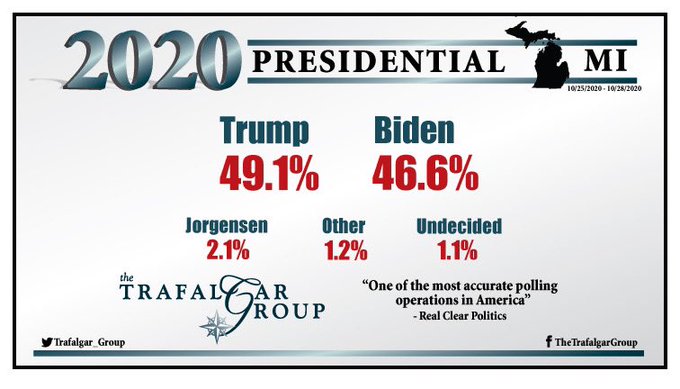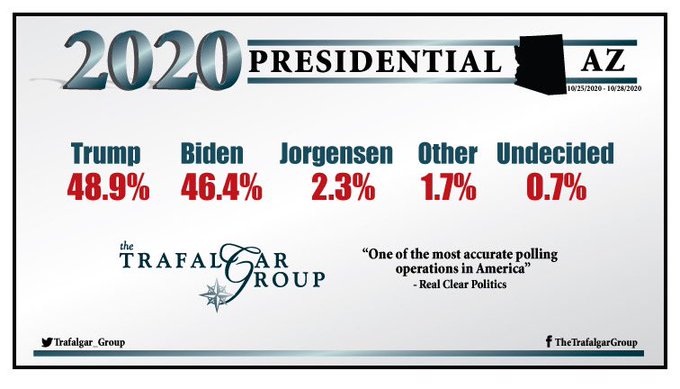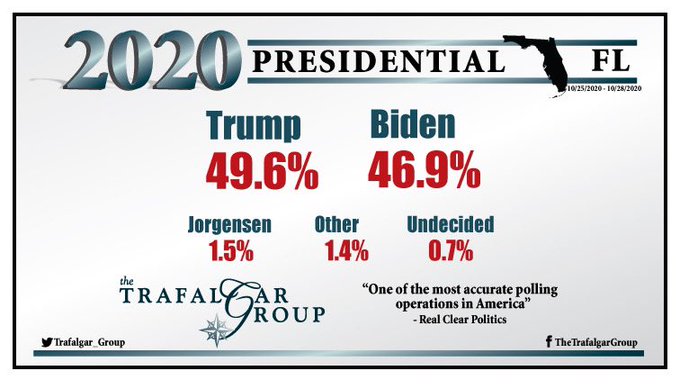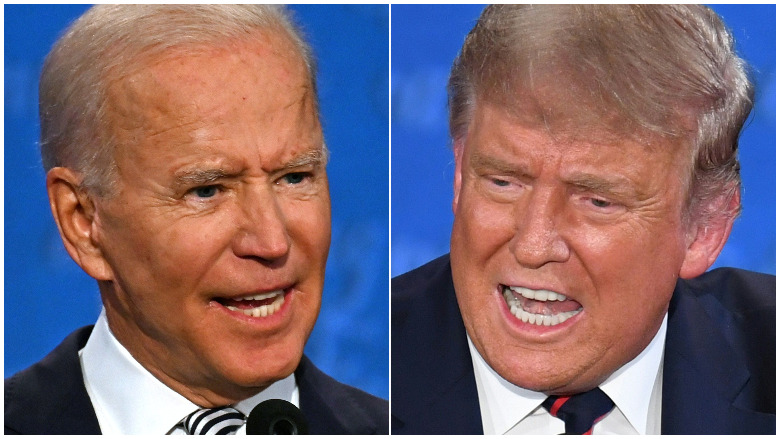
Former Vice President Joe Biden leads in most polls in many battleground states. Except, that is, for the polls from the Trafalgar Group, a boutique polling company out of Atlanta, Georgia.
Why is that getting attention? Because Trafalgar is a pollster that correctly predicted Trump would win the Electoral College in 2016. Trafalgar Group had the only polls showing Trump winning the battleground states of Pennsylvania and Michigan that year. The group also correctly predicted that Trump would win North Carolina and Florida in 2016. Most other pollsters got 2016 wrong.
This time around, it’s almost a replay. Everyone else is producing polls showing Trump being defeated by Biden, but not Trafalgar. To be sure, the polling company’s methodology – such as teasing out so-called “shy” Trump voters – is not without its critics. “There are more [shy Trump voters] than last time and it’s not even a contest,” Robert Cahaly, of Trafalgar, told The Hill.
He told CNN he thinks that will be enough for Trump to win in 2020.
Some prominent election analysts, notably FiveThirtyEight’s Nate Silver and Cook Political Report editor Dave Wasserman, are not fans of Trafalgar’s polling, according to The Hill. Silver wrote on Twitter, “I’m not a Let’s Delve Into The Crosstabs guy, but some of the s*** here is just crazy. Trump is not going to win 30% of the Democratic vote in Michigan. Biden is not going to win 25% of Republicans. Trump is not going to win independents by 32 points.” He added, “I don’t know exactly what they’re doing, but it’s not a good sign that I always know what a Trafalgar Group poll is going to say without having to open the link.”
However, another Twitter user hit back at Silver, saying, “Maybe you’re right but saying this about one of the few outlets that actually called the 2016 election accurately when you yourself was so wrong is pretty arrogant.” Cahaly fired back, calling Silver “obsessed.”
Trafalgar is not without other critics. The New York Times reported that Trafalgar “does not disclose its methods, and is considered far too shadowy by other pollsters to be taken seriously. Mostly, they dismiss it as an outlier.” The Times noted that Trafalgar’s Cahaly in 2016 even called the “exact number of Electoral College votes” received by the candidates. But concerns center around funding and methods transparency.
The Times noted that Trafalgar releases “almost no real explanation of his polling methodology.” You can see the group’s methodology page here. Another expert cited by The Times disputed Cahaly’s belief that there are “shy” Trump voters unwilling to admit their support for the president. The Times also reported that Trafalgar’s clients are mostly Republican and conservative, and Cahaly has “not reliably revealed” when polls are paid by “partisan interest,” which is a defiance of industry standard.
“It is wildly inappropriate not to tell me, not only what modes you use to draw your sample, but how specifically you did it,” Josh Pasek, a professor of communications, data and political science at the University of Michigan, told The Times. “If somebody’s not transparent you can generally assume they’re crap.”
So, all of the debate aside, what does Trafalgar show in its recent polling? This is how the electoral college map looks based on Trafalgar’s current battleground polling:
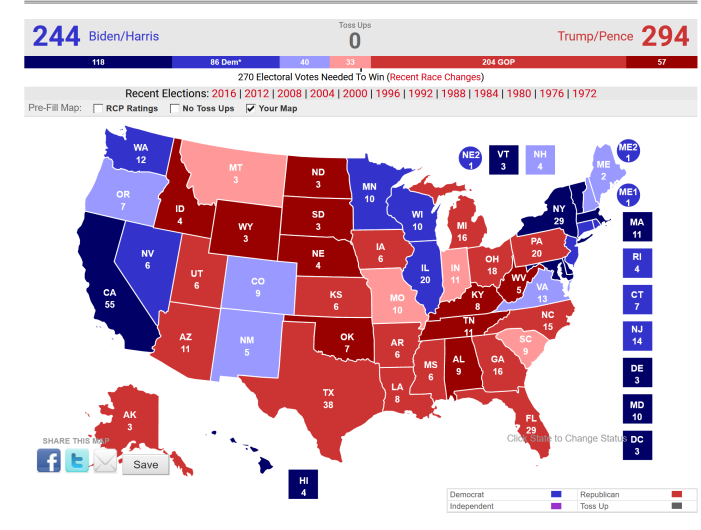
Trafalgar’s election predictions as of November 1.
Here’s what Trafalgar is seeing in its polls as of November 1:
Michigan – Trump Leads in Trafalgar Polling
49.1% Trump
46.6% Biden
2.1% Jorgensen
1.2% Other
Taken 10/25-28
Arizona – Trump Leads in Trafalgar Polling
48.9% Trump
46.4% Biden
2.3% Jorgensen
1.7% Other
Taken 10/25-28
Pennsylvania – Trump Leads
48.4% Trump
47.6% Biden
2.2% Jorgensen
0.7% Other
Taken 10/24-25
Florida – Trump Leads
Donald Trump 49.6%
Joe Biden 46.9%
Jo Jorgensen 1.5%
Someone Else 1.4%
Undecided 0.7%
Released Oct. 31
North Carolina – Trump Leads
48.6% Trump
46.5% Biden
2.6% Jorgenson
1.4% Other
Take: 10/27-29
Minnesota – Biden Leads
48.0% Biden
44.8% Trump
3.3% Kanye West
2.0% Jorgensen
0.8% Other
Taken Oct.24-25
Wisconsin – Biden Leads
47.5% Biden
47.1% Trump
3.1% Jorgensen
1.2% Other
Taken Oct. 24-25
Nevada – Biden Leads
Joe Biden 49.4%
Donald Trump 47.1%
Jo Jorgensen 1.7%
Someone Else 0.9%
Undecided 0.9%
Released Oct. 29
Trafalgar Group’s Methodology
Trafalgar Group is a polling organization that suspected all Trump supporters weren’t willing to be honest with pollsters in 2016 about whether they supported Trump. It’s called the social desirability effect, whereby voters don’t feel it’s socially acceptable to admit voting for Trump, but they will do so in private. So the pollsters started asking people who they thought their neighbors would vote for and determined the numbers were different. The firm, which is based out of Atlanta, adjusted its numbers to account for this factor in 2016. “On a live poll, the deviation was that Trump was understated probably 6%-7%, and on an automatic poll it was probably understated 3%-4%,” Trafalgar’s Robert Cahaly told TIPP Online in 2016.
RealClearPolitics reported in 2018 that Trafalgar’s model in 2016 also factored in “a unique method that sought to measure support from voters who’d been ‘inactive’ in recent election cycles.” The site reports that Trafalgar also correctly predicted Republican Ron DeSantis’s Florida gubernatorial victory, which other polls missed, as well as Senate races in multiple states, after the 2016 presidential election. “The pollster believes his method and methodology will be more valuable than ever as low voter response rates and social desirability bias continue to present challenges to all pollsters in the future,” the site reported. Trafalgar didn’t poll Wisconsin in 2016.
Heavy spoke at lengthy with Cahaly about the 2020 election on June 29, 2020.
In the interview, Cahaly told Heavy that the firm has changed its methodology somewhat for 2020 but wasn’t going to reveal all of that information until the election was over. However, he said that he believes most other polls are inaccurate, calling them “Pony Express polling that most of the other groups use these days.”
For example, he believes that calling a small number of households’ landlines with long questionnaires isn’t very effective because “I don’t think average people take those polls.” He said such polling tends to over represent “people who care too much on both sides. It over represents the people who have strong opinions. The people in the middle don’t have time to fool with it.”
He believes that people are more hesitant to tell pollsters who they’re voting for today than they were in 2016 because we live in a society in which “people get penalized for their opinions. They’re not going to tell you what they think of the protests, of the riots, of statues. It’s significantly worse, especially with groups that it would be out of character for them to say so.” For example, he feels there is more minority and college-educated female support for Trump than people will admit.
He said Trafalgar does do some phone calls, but “we compensate for that in the way we ask the questions,” and the firm also does a lot of digital, text, email, and other methods. “We guarantee anonymity. We’re not working for a campaign or party.”
He said the firm has ways of getting at the social desirability effect that he wouldn’t detail. He said he believes that the 7.5 percent in the Wisconsin poll listed as supporting a third-party candidate actually contains a “few percent for Trump in there.” He called those shy or “reluctant voters.” He believed there would have been a social desirability effect with Bernie Sanders too but not with Biden.
He added that people don’t trust pollsters. “People don’t want to be on a list,” he said.
“I can tell you looking internally I think there is a significant amount of people for Trump” in the undecided or third-party category, he said.
He said the biggest risk for Democrats is “overconfidence.”
Cahaly said the firm works hard to identify a pool of voters who aren’t consistent voters. Perhaps they voted provisionally. They created a “fingerprint of what a Trump voter looked like,” and matched it to the characteristics of voters who “hadn’t voted in many years” to get them back “in the pool” of those who might be sampled. He said that he doesn’t believe the firm undersampled certain demographic groups, like ethnic minorities, because they are likely included in the unidentified demographic category as a lot of states don’t collect that information about voters.
He thinks that voters “like Joe Biden” generally but that some are concerned he’s not the one who will be “running the show.”
He insisted that the “pony express polling model” that he believes others use “is wrong” and said that the people who got it wrong in 2016 “refuse to change. They need to get into the real world a bit.”
READ NEXT: Why the Polls Were So Wrong in 2016

